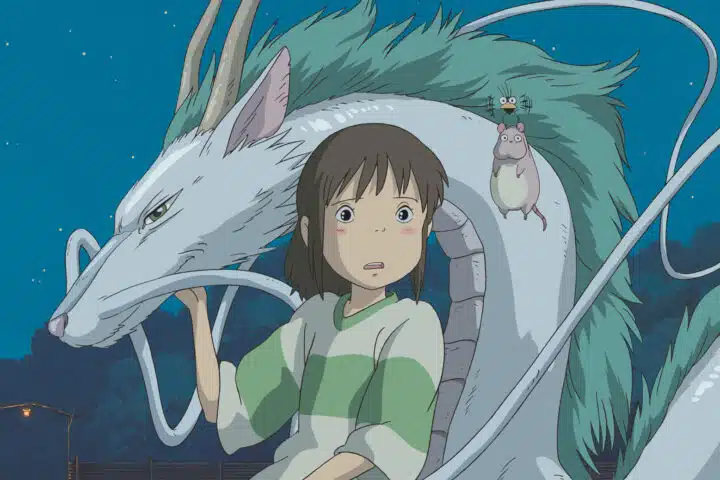
Chihiro from Spirited Away is my Environmental Hero
July 26, 2023By Malika Gizzat, 2023 Future Blue Youth Council member
All images from Studio Ghilbli
Did you know that July is the 22nd anniversary of Spirited Away? An award-winning film by Studio Ghibli that captured the hearts of millions across the world, many critics have described Spirited Away as “a personal narrative relatable to all, boundless imagination of the story, a thoughtful and logical plot with fascinating details.”
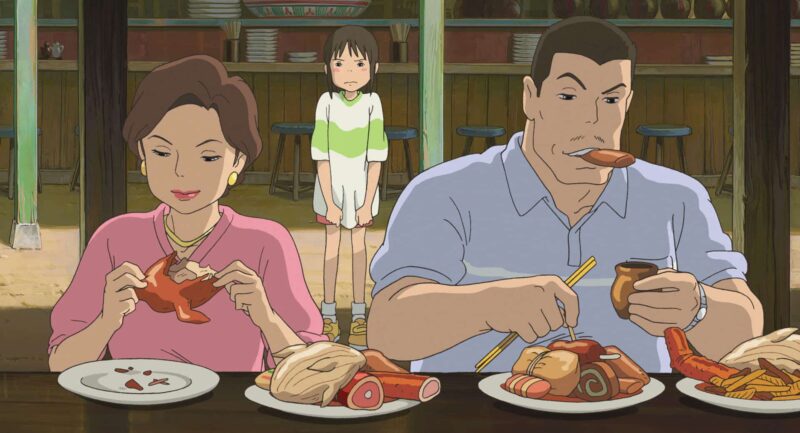
The animated movie follows a girl, Chihiro and her parents who stumble upon an abandoned amusement park on their way to a new home. There they found large portions of food left at a small shop. While Chihiro tried to convince her parents to not touch the food, (since there was no owner of the shop), they still selfishly gorged themselves on it, grasping everything they saw. As a result, Chihiro’s parents turned into pigs that continued eating without acknowledging their daughter. Seeking help, Chihiro stumbles into a spirit world not far away from the park. There she starts working in a bathhouse owned by Yubaba – a greedy and formidable witch who exploits all of her workers. On her journey, Chihiro also meets other characters like Haku, Chihiro’s protector, who guides her through the spirit world and helps her rescue her parents; No-Face, a calm and mysterious spirit that the main character encounters in the bathhouse; and Zeniba, Yuzuba’s benevolent and kind-hearted twin, who assists Chihiro, Haku and No-Face.
Chihiro surely is a resilient and courageous character determined to save her loved ones, but have you ever thought of her as an eco-activist? There is a key moment in the movie where a Stink Spirit full of debris comes in to use the bathhouse. While everyone else turns their nose to the Stink Spirit, Chihiro works hard to help it. Chihiro finds and removes a bicycle from the stink spirit, which causes all kinds of other pollution to spill out. We then find out that the Stink Spirit was actually a River Spirit that had been filled with tons of rubbish. In creating the Stink Spirit, Spirited Away Director Hayao Miyazaki was inspired by his own experience cleaning a highly polluted river (he even found a bicycle in it, just like in the movie!). The River (Stink) Spirit symbolizes the damage we cause to our Mother Earth. By helping the River Spirit, Chihiro fights the consequences of the pollution she didn’t contribute to, of the harm she never caused.
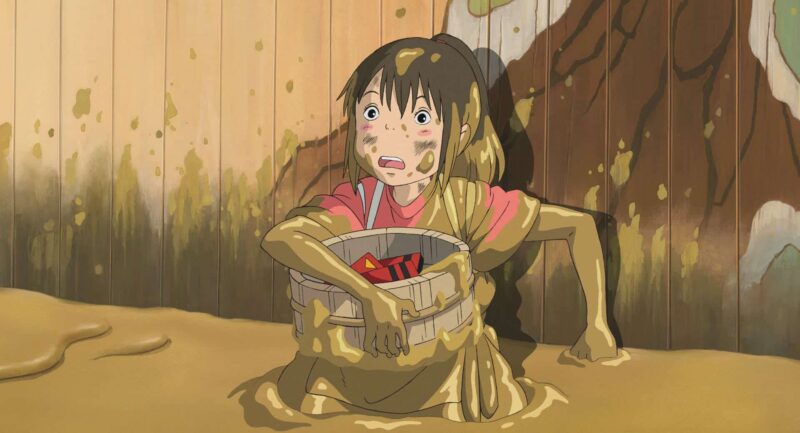
I see Chihiro as an allusion to all the people who are struggling the most with extreme weather events and environmental injustice, despite contributing to them the least. Chihiro has no choice but to clean up other people’s (and spirits’) mess, as do underrepresented regions of developing countries. Wealthier countries, the biggest contributors to greenhouse gas emissions, take a toll on developing countries. For instance, despite contributing very little to greenhouse gas emissions, Africa is home to many of the world’s most climate-vulnerable countries like Kenya and Rwanda. Between March and July 2018, Kenya experienced almost twice the normal rainfall of its regular wet season, overflowing the country’s most important river and displacing more than 300,000 people. By helping the River Spirit, Chihiro embodies citizens of various countries across the world who don’t have enough resources and power to mitigate and adapt to ecological catastrophes yet continue to fight for change.
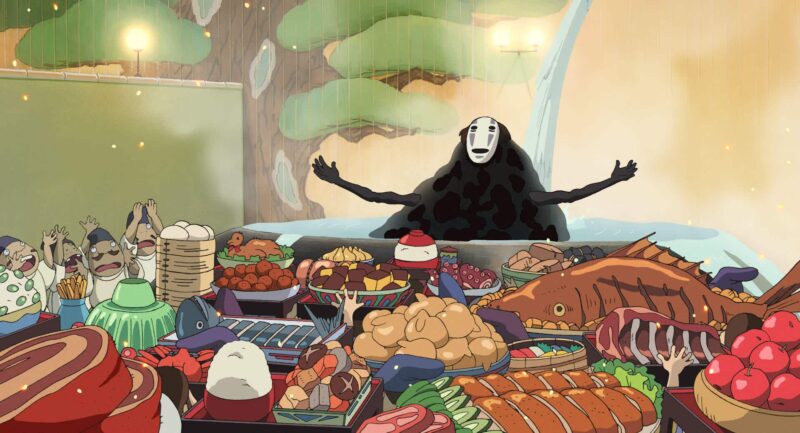
Chihiro meets another mysterious character in the Spirit World called No-Face. No-Face is a vivid personification of society’s greed, materialism, and over-consumption that has led to the exploitation of human work and natural resources. “I am lonely, lonely,” reiterates No-Face as it devours everything and everyone in its way. It tries to escape its loneliness by over-consuming food to “fill” its soul’s emptiness, – a similar thing happened to Chihiro’s parents, remember? These characters depict our habitual excessive resource extraction at an unsustainable rate, which leads to the deterioration of the natural world. I believe that alarming food waste and fast fashion problems and their ubiquitousness in our life is an ironclad case of our overconsumption culture. Terrifying statistics show that about 1.3 billion tons of food is wasted and 92 million tons of clothing end up in landfills per year. This means that a rubbish truck full of clothes ends up on landfill sites every second (about 70 trucks filled up with no longer-needed clothes while you were reading this). We, just like No-Face, tend to indulge in things that recklessly harm our planet. Furthermore, it’s no secret how unethical the fast fashion industry is, considering how unsafe and immoral the work conditions the employees endure. Similarly, we can see Chihiro and other characters overworking and being exploited by the bathhouse proprietor, Yubaba.
Throughout the movie, we also learn that Yubaba assigns a new name to every employee in order to control them. Many characters, including Chihiro’s friend Haku, eventually forget their real names, meaning they lose any chance of ever leaving the bathhouse. But most importantly, it means that they also lose their unique identities and cultural peculiarities.
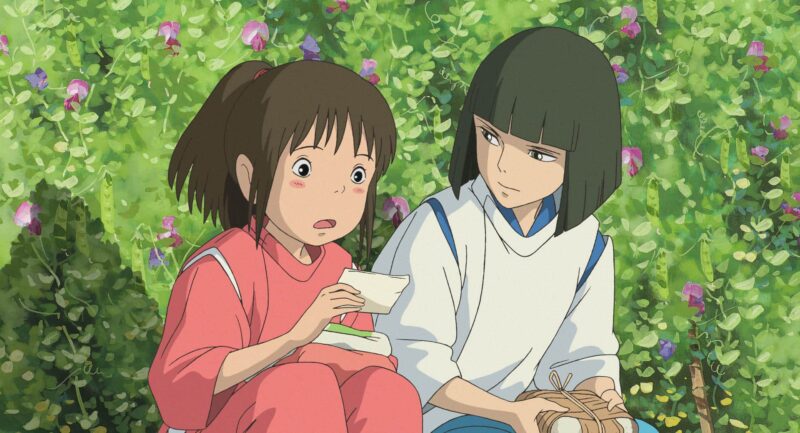
To me that speaks of the colonialism that my country Kazakhstan has faced up until the end of the 20th century. Not only were our roots erased, but our bodies of water were depleted in the name of economic growth. Similarly, Chihiro’s and Haku’s native rivers are also sacrificed for human settlement; Haku says that the river he once called his home is “all apartments now.” Therefore, Miyazaki calls attention to the destruction of nature to achieve industrial progress, and how our greed impacts our relationship with nature.
Despite the poignance of human pollution illustrated in the movie, the characters of Spirited Away show that there is always a place for unwavering hope, even in such tragic moments. For example, after Chihiro frees the River Spirit of its polluted burden, it generously expresses its gratitude to Chihiro and overflows with happiness. We, the human nation, are also making impactful steps toward a green future – including a significant increase in solar energy usage in Europe and a decline in deforestation rates in Brazil, plus many more.
Secondly, at the end of the movie, No-Face finds comfort in Zeniba’s care, who is the kind-hearted foil to Yubaba. No-Face learns that living wastefully can’t cure sadness. Moreover, Chihiro uses her sympathy and selfless love for her family to save them and turn them into humans again. And how exciting it was to see Chihiro and Haku break free from the chains of Yubaba’s exploitation after rediscovering their real names! “My mum told me that once when I was little, I fell into a river. She said that they had drained it and built things on top of it,” explained Chihiro. “But I’ve just remembered. The river was called the Kohaku River. Your real name is… Kohaku,” she added, helping Haku remember his real name, his roots, and his cultural heritage. I feel like this message can be extremely inspiring to so many people that feel locked out, unheard, and unrepresented. It shows there is always a way to break these barriers and amplify their voices, as well as find their origins.
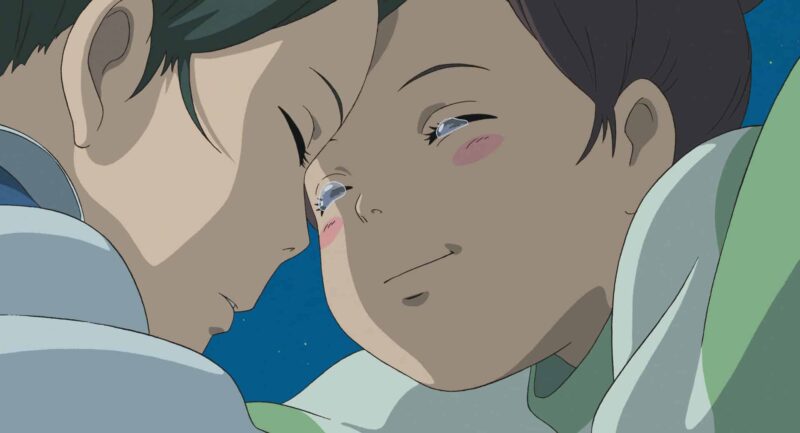
Spirited Away is an incredibly powerful movie that uses art as a thought-provoking advocacy tool, the meaning of which can be easily understood by every person. Hayao Miyazaki uses artistic storytelling to not only spread awareness about our ecological problems, but to also encourage us to act. Much like Chihiro saved her family, we are still capable of repairing the damage we’ve caused to our planet.
